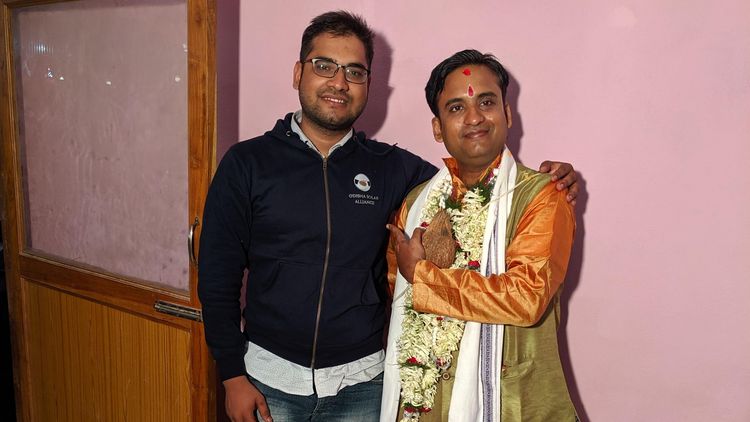Tribikram Mishra from India (EMRE 2020-21) co-organized a near carbon neutral event along with renewable and sustainable enthusiasts of Odisha, India in 2019. The carbon neutrality of the event is finally audited and published.
The team along with the groom and bride were felicitated by state energy ministry of Odisha on National energy conservation day in December’19 for this unique attempt towards sustainability. The auditing was performed by carbon footprint auditors from “Samuchit group”, one of the carbon auditing firms of India. All the safety measures related to solar energy harvesting and electrical connections were checked and verified by “White Shark Energy Pvt. Ltd”, a solar energy engineering company of Odisha.
In India, the weddings are grand festive celebrations among families and relatives. During such occasion due to large number of incoming guests and food along with accommodation the carbon miles and footprints increase exponentially. On an average a big fat wedding in India causes 60-80 tons of carbon emission at once. In the year 2019 one of a kind “Near carbon neutral wedding” was organized by some of the renewable energy and sustainability enthusiasts in Odisha. The wedding was a 9 day-long event, and the execution of the project took place in a remote village of Odisha, Balikuti, Balasore. The young enthusiasts from varied background in sustainability came together to execute this one-of-a-kind project. Mr. Saswat Panda (groom and Infrastructure and energy management lead engineer) along with Mr. Tribikram Mishra (EMRE 2020, Solar energy engineer), Mr. Sanjoy Sahoo (CRI Solar Pump division), Mr. Yanshu Agarwal (Green Architecture) and Mr. Utkal Gaurav Panda (Logistics and bio energy management), backed by the sponsor Mr. Balaji Singh undertook the assignment. The event was audited to be having a 4.44 tons of CO2 emissions throughout the period.
The main aspects of the project were to create awareness among the rural community and to adopt alternate technologies for better sustainability. The principles of the project were as follows.
- Reduction of carbon emissions using alternate technologies.
- Sustainable deployment.
- Financially viable.
- Technically feasible.
- Socially acceptable.
- Deployment on ad hoc basis during emergency.
- Socio-economic development and sustainably independent solutions.
Objectives of this near carbon neutral event were:
- To explore the viability of carbon emissions and reduction processes.
- To evaluate and improvise the associated processes for reduction of carbon emissions.
- To improve solid waste management processes and to use them as biomass energy in the later stage.
- To understand the ideologies and acceptance of public on such carbon neutral events and initiatives.
- To evaluate an approximate economic viability of a carbon neutral event.
- To improve livelihood of local community by procuring the local resources and limiting outsourcing.
Although, the event was a successful attempt towards a new horizon of near carbon neutral event, several technological challenges that came along the way that really questioned the adaptability of such events and their viability in the grassroot level. The economic viability is something that needs to be considered along with the technological deployment. Adaption of the process is easy, but all the methods and processes involved are still at an early stage in terms of reliability. The real challenge is to minimize the cost of the systems to be implemented without any compromise in standards. However, the attempt towards a new page of sustainability is praiseworthy and satisfactory. Nevertheless, it was a truly Solar + Bio energy + Waste management + carbon reduction = near carbon neutral sustainable event.
contact: tribikrammishra00@gmail.com



